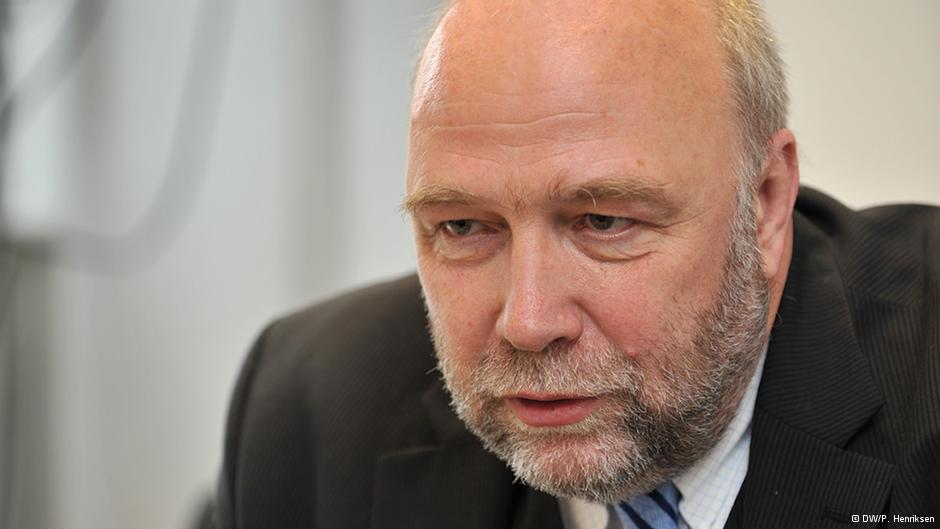EU urges southern Africa to open up its markets
DW 03.05.2013
EU urges southern Africa to open up its markets
Adrian Kriesch
The European Parliament has set a deadline of early 2014 for countries in southern Africa to open up their markets. Failure to comply could mean they are no longer able to export duty-free to the EU zone.
For years, the European Union (EU) has been urging countries in sub-Saharan Africa to open up their markets. For Jean Pierre Imele, this would be a disaster. His company Biotropical produces and processes fruits in Cameroon, of which 90 percent are exported to the European Union.
Imele is worried about the ongoing negotiations over a free trade agreement between his government and Europe. For now, he benefits from a transitional agreement and can export his products tax-free to the EU, while negotiations on a final agreement continue.
The EU wants to seal the final agreement as soon as possible but the Cameroonian government still wants to discuss details.
The European Parliament is now applying more pressure and has announced that if Cameroon and other sub-Saharan African countries do not sign by early 2014 that they will allow the EU free access to their markets, they will lose all trade benefits.
“If this happens, we are sure we are going to be affected because our fruits are going to compete with the fruits from South America and India,” says Imele. “We have so many problems here, we don’t have assistance from the state so if we have to pay taxes again then am sure we are going to be kicked out of the market.”
WTO calls for change
The background to the trade dispute is complicated. For decades Europe’s former colonies have enjoyed preferential access to European markets, thanks to various trade agreements. For example, in 1975, 79 countries from Africa, the Caribbean and the Pacific, a group known as the ACP countries, signed a trade agreement in Lome.
However, in 2000, the World Trade Organization (WTO) declared the one-sided market access to be unlawful.
The Cotonou Agreement followed and since then Europeans and Africans have been negotiating over Economic Partnership Agreements (EPA).
John Clancy, the European Commission’s trade spokesman, says it’s all about free trade in both directions as required by the World Trade Organization.
"Of course you can’t have one set of rules for the ACP countries and another set for other developing countries in other parts of the world, for example in Latin America.” Clancy told DW.
’Unwise for Africa to sign’
The World Trade Organization does allow for unilateral market access in exceptional cases. This applies to the world’s least developed countries, 34 of which are in Africa.
Based on this, the EU has concluded a special agreement with these countries, known as the "Everything but Arms" agreement (EBA). This means they can export all products except arms duty-free into the EU. These countries face no consequences if they do not sign the free trade agreement with the EU.
However, some more developed countries such as Kenya, Ghana, Cameroon and Botswana would lose their prvileged access to EU markets. Economist Paul Collier says the EU’s interpretation of the WTO rules is too strict.
He points out that, since 2000, the US has allowed tariff-free access for many products from Africa, thanks to the "African Growth and Opportunity Act " (AGOA) - and the WTO has never intervened.
In an interview with DW, Collier said it would be "rather unwise" for Africa to grant preferential market access to Europe. Instead of continuing to threaten with deadlines, the EU should rethink its strategy.
Jobs at risk
Collier’s suggestion is that Europe opens up for Africa, while African countries open their markets for each other. Among the continent’s 55 countries, there are still some high trade barriers, he says..
If all of Africa were to become a free trade zone, that would also have advantages for Europe. Africa would become wealthier and provide a large market where Europe could operate more easily.
“The reason why there is no success is that it is not what Africa wants,” Collier says. “Africa would indeed be rather foolish to concede preferential market access to Europe when its more sensible route to trade liberalization would be to reduce trade barriers to all.”
Within the EU, the EPAs are also controversial, and even German Chancellor,Angela Merkel’s advisor on African affairs, Günter Nooke , has doubts. "I think we have to return to zero and start again,“ he told DW.
For now, there is no sign of this. The European Commission is pressing ahead with the free trade agreement strategy, backed by the conservative majority in the European Parliament.







